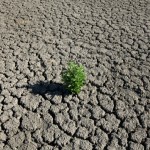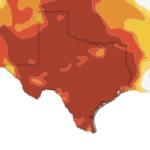Hurricane Isaac: Some Possible Upsides of a Devastating Storm

Photo by John Moore/Getty Images
Bridgette Mooney, her daughter Skyler, 15 months, and husband Kevin watch from their home as Hurricane Isaac lashes their property with rain on August 28, 2012 in Kiln, Mississippi. Many residents of the community, which suffered severe damage during Hurricane Katrina in 2005, decided to stay home and ride out the storm.
As Hurricane Isaac inflicts widespread human misery by pummeling Louisiana and the Gulf with wind and rain, you may be wondering if anything good could come of this.
For some farmers in the Midwest struggling with extreme drought, the storm could bring much-needed rain. AccuWeather says today that parts of Arkansas, Missouri and other states in the Central U.S. will “soon be on the receiving end of soaking downpours.”
“While flooding rainfall in southeastern Louisiana and southern Mississippi will tend to diminish farther inland, some beneficial rain will fall on the parched landscape hundreds, if not a thousand, miles away from the Gulf Coast,” the weather service says in a report today.
But none of that rain looks like it’s headed to Texas.
And whatever the rains do to help the Midwest, they are mostly coming too late.
“The rain is coming far too late for this summer’s crops, such as corn and soybeans,” Accuweather says. But the rain could help some of the winter wheat crop, according to AccuWeather Agricultural Meteorologist Dale Mohler.
“The wheat over the central and southern Plains is generally planted during September, and replenishing soil moisture prior to planting after summer drought is essential for any new crop,” Mohler says.
For Texas, so far the major impacts of Isaac have been a shutdown in oil production in the gulf, already resulting in some pain at the gas pump.
But there’s one more possible upside of the storm. It could provide further relief to the “dead zone” in the Gulf of Mexico, where fertilizers, runoff and other factors create a low-oxygen environment in the Gulf known as hypoxia. That kills fish and wildlife.
So a hurricane like Isaac could actually stir things up, helping to alleviate the dead zone.
“If a tropical storm or a hurricane goes over the dead zone, it’s able to mix that water from top to bottom, so it essentially elimnates that zone,” Edward Buskey with The University of Texas Marine Science Institute told StateImpact Texas earlier this month.
He likens it to Italian vinaigrette, where if it sits for too long the oil will sit on top of the vinegar. But once the bottle is shaken up, it mixes together again. So the lighter fresh water on the surface can be mixed back up with the denser salt water below during a major storm, Busky said, getting read of the dead zone for a time.

